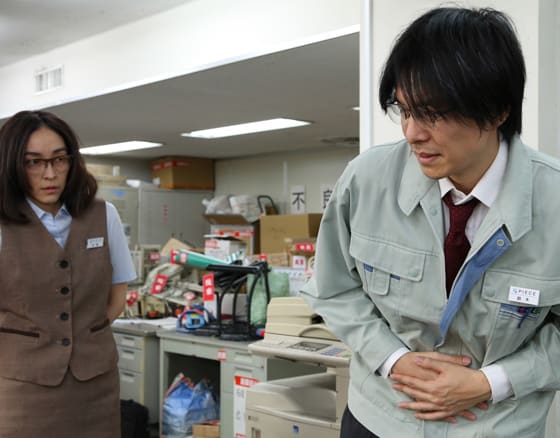Love & Peace is a different kind of film than expected for both director Sion Sono and the Toronto After Dark Film Festival. Sono is known for being an incredibly diverse filmmaker, and he's proven it this year, covering a broad range of styles across his six films released in 2015. Love & Peace, though, is so touching and likeable that it's hard to imagine this director has also made splatter-fest horror films. Because this isn't a horror film, its inclusion in Toronto After Dark seemed like an odd choice, but I'm sure glad they did, because it's pretty special.
Love and Peace is the story of Ryuichi Suzuki (Hiroki Hasegawa), a sad sack 33-year-old whose band from ten years ago failed due to his total lack of charisma, social skills and all-around awkward weirdness, which also accounts for his lack of friends. Ryu has a pathetic little apartment, a pathetic little job and a pathetic little crush on his cute, nerdy co-worker Yuko (Kumiko Aso).
When he makes a spur-of-the moment decision to buy a tiny pet turtle he names Pikadon, after an atomic bomb retrospective on TV ("pikadon" is Japanese for "kaboom"), he tells all his dreams to the adorable little guy. From being a celebrated indie rocker to a big-shot manager, having a hit single to selling out stadium concerts, Ryu wants it all. And thanks to a sweet but totally bonkers side plot about a hobo (Toshiyuki Nishida) who rules over a small community of talking abandoned toys and pets, it seems like Ryu just might get it.
To avoid any plot spoilers, it's difficult to explain more than this; Sion Sono's films have to be seen to be believed, and watching the events unfold provide the film's delight. Love & Peace is funny, heartbreaking, and weird, and it manages to strike the right tone for all of them. Sono is adept at avoiding schmaltz by adding some much-needed levity to emotional scenes, and balancing slapstick (Hasegawa is pretty masterful at the art of the ugly cry) with attention to character detail that provokes genuine investment in his characters. It all takes on a really retro feel, harkening back to an era of Japanese romantic dramas and retro Jim Henson-esque puppets where surrealist fairy tales coexisted alongside real pathos and longing.
If the film has one fault, it's Sono's tendency to let his own great ideas run away with the film. At just under two hours, Love & Peace could have used a more stringent editor, especially in the subterranean "Island of Misfit Toys" scenes, which feature just a bit too much exposition, even if it all pays off in the end. And while I'm aware that perhaps I didn't need more scenes of talking, animatronic cat plushies, it's hard to say no to just one more when they're such a joy to watch.
(Universal / Asmik Ace Entertainment)Love and Peace is the story of Ryuichi Suzuki (Hiroki Hasegawa), a sad sack 33-year-old whose band from ten years ago failed due to his total lack of charisma, social skills and all-around awkward weirdness, which also accounts for his lack of friends. Ryu has a pathetic little apartment, a pathetic little job and a pathetic little crush on his cute, nerdy co-worker Yuko (Kumiko Aso).
When he makes a spur-of-the moment decision to buy a tiny pet turtle he names Pikadon, after an atomic bomb retrospective on TV ("pikadon" is Japanese for "kaboom"), he tells all his dreams to the adorable little guy. From being a celebrated indie rocker to a big-shot manager, having a hit single to selling out stadium concerts, Ryu wants it all. And thanks to a sweet but totally bonkers side plot about a hobo (Toshiyuki Nishida) who rules over a small community of talking abandoned toys and pets, it seems like Ryu just might get it.
To avoid any plot spoilers, it's difficult to explain more than this; Sion Sono's films have to be seen to be believed, and watching the events unfold provide the film's delight. Love & Peace is funny, heartbreaking, and weird, and it manages to strike the right tone for all of them. Sono is adept at avoiding schmaltz by adding some much-needed levity to emotional scenes, and balancing slapstick (Hasegawa is pretty masterful at the art of the ugly cry) with attention to character detail that provokes genuine investment in his characters. It all takes on a really retro feel, harkening back to an era of Japanese romantic dramas and retro Jim Henson-esque puppets where surrealist fairy tales coexisted alongside real pathos and longing.
If the film has one fault, it's Sono's tendency to let his own great ideas run away with the film. At just under two hours, Love & Peace could have used a more stringent editor, especially in the subterranean "Island of Misfit Toys" scenes, which feature just a bit too much exposition, even if it all pays off in the end. And while I'm aware that perhaps I didn't need more scenes of talking, animatronic cat plushies, it's hard to say no to just one more when they're such a joy to watch.




